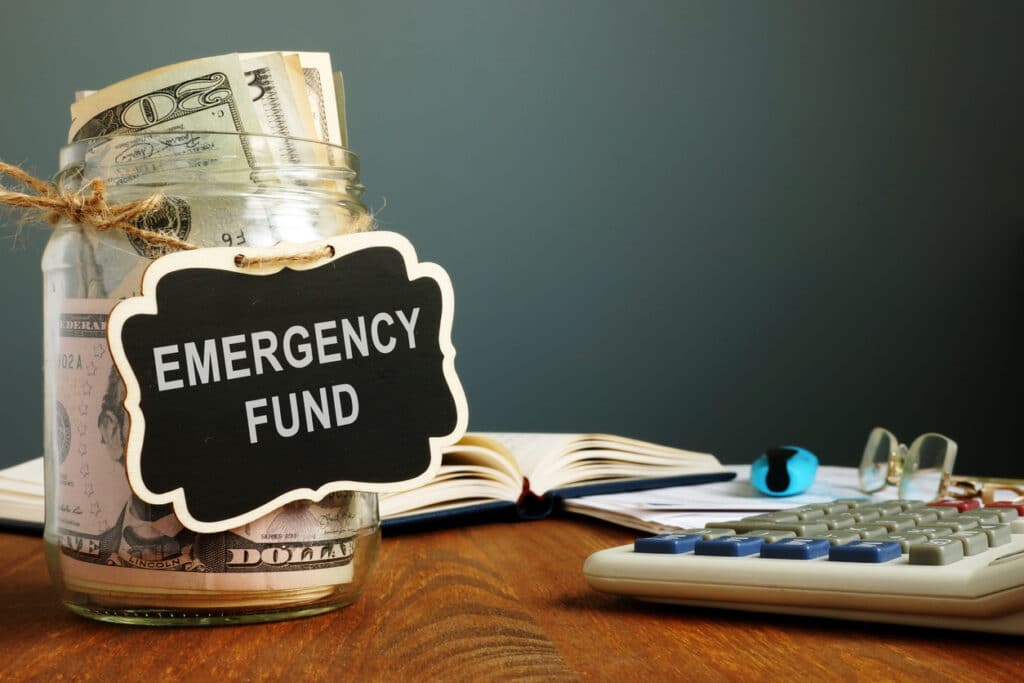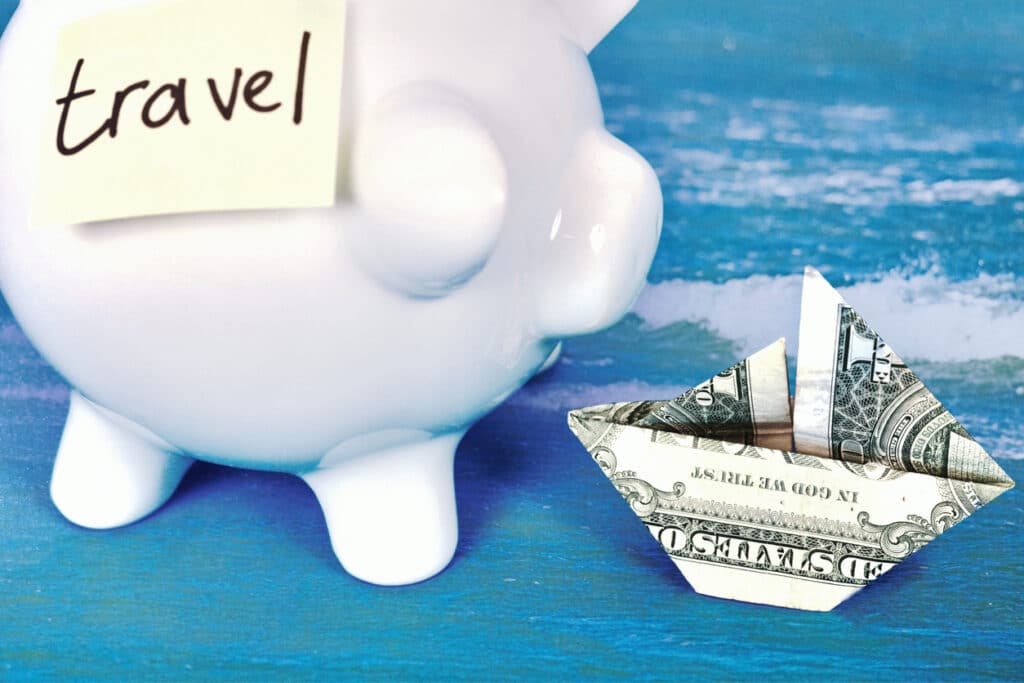
How to Make Your Savings Stick Around a Bit
Regardless of your income, it can be difficult to build savings. We all know we should be building savings and not just using it for any purpose, but we haven’t really been told how to do that.
“Just Save Money”
Just expecting yourself to automatically build savings is not enough. It sounds like an incredibly do-able strategy for savings, right?
Conventional bits of wisdom like this make it sound incredibly easy to just magically be able to build savings. Unfortunately, it’s not that easy (but it certainly isn’t that hard).
Building (and keeping) savings isn’t a financial tool, it is the result of a well-built, personalized financial tool.
That simplistic expectation of just being able to save means the possibility of failure is high. I know it looks like everyone else may have their act together as far as savings, but believe me, they do not.
That false expectation of savings just being automatic and easy sets you up for failure. And once we have a few “failures” under our belts, we are highly unlikely to try again.
Start Building Your Savings Slow and Small
Even if on paper you can’t see any reason you couldn’t be saving $500 a month, start with $50. It doesn’t sound like this is going to result in having any savings at all, right?
But the slower you save money, the slower you UNsave it. This is about learning to trust yourself!
Start small, prove to yourself that you can keep with it for a month or two, then very slowly start to increase the amount you’re saving. Savings doesn’t do any good if it zips right back out of your account, so be gentle, go slow, and really savor your savings account balance!
Celebrate Your Savings as It Grows!
That doesn’t mean only celebrating $1,000, or six months of expenses, it means every month looking at your savings balance, or what you contributed, and bringing that home as a win. There is a very common, and legitimate concern that “If I see the money in my account, I’ll be tempted to spend it.” Hiding money away from yourself only confirms that you can’t be trusted.
By practicing savoring what you’ve done well rather than what you’ve “failed” at, you’re reinforcing abundance and making your savings naturally stickier.
Yes, even if the money went right back out again, celebrate when money goes into savings.
Carefully Name Your Savings
Very often we just call our savings “savings” or “emergency fund” or “rainy day fund.” But how would you know when to use that money? And how do you know when to leave it where it is?
Not knowing if or when to use savings can lead to a lot of ugly conflict, especially for couples, but some of that can be prevented if you carefully name your savings.
If you were to give your emergency fund a job, what would it be? What is the emotional benefit of your emergency fund? What is it meant to protect you from? Basically…
…how do you know when to use your savings?
If your answer to that question is “If I lose more than 30% of my income,” then name that savings “loss of income” (or similar). Now imagine you have that “loss of income” fund, but you’d like to put in a new deck. Can you use the “loss of income” fund for a new deck? TECHNICALLY, you sure can, but are you likely to? Probably not. Why? Because you named your savings carefully, and once we do that, our brains have a hard time deviating. We like to categorize, sort, and organize things, including dollars!
The more specific a job you give this money, the easier it will be to make a decision on when and how to use savings.
Consider More Than One Kind of Savings
Saving is a strategy and can get fairly complex. I encourage my financial coaching clients to have three kinds of savings.
(I get that that may sound overwhelming, but it doesn’t need to be. If it helps, think about your savings strategy as a kind of ecosystem… every element is connected to the others, and they all have a role to play.)
There are three “flavors” of savings:
Long-Term Savings
The purpose of building long-term savings is to smooth out the highs and lows of spending and income over years. However you name it, savings like this is for quickly handling big emergencies like a flooding water heater, or taking advantage of opportunities like a screaming deal on an investment property. Withdrawing from long-term savings typically comes along with a lot of thoughtfulness. Money goes in but rarely comes out.
Don’t think about these two questions too long!
How much should be in this big savings account? (The first answers are usually the correct ones!)
And how would you know when it’s time to use this savings? (Name this big savings after that thing: loss of income, tree falls on house, investment property, illness, etc.)
Short-Term Savings
The purpose of this kind of savings is to protect the long-term savings. This is typically a smaller dollar amount and money moves in and out of these funds quickly.
No matter how great your planning and budgeting is, occasionally something comes out of left field, and this “fly-swatter account” is great for just smacking down that annoying thing without much fuss. (If you have no savings, I recommend starting here).

Commonly there is little emotional investment with using and refilling this kind of savings because that’s its whole purpose!
Same questions again! How much should be in this account? How would you know when to use this account? (flat tire, minor injury or illness, etc.)
Project-Based Savings
These are the savings or funds that come and go as your life changes. Installing that deck, buying a car, extended time off work, getting a tattoo (yes, really), and vacations are all things I’ve seen people set aside money for in these project-based funds.

These project-based savings are typically pretty easy to name, AND you know how much is needed in each. And they’ll pop in and out of existence over time. Typically (but not always), these are the first accounts to be pivoted if something really goes sideways.
In Conclusion
How you plan, name, and structure your savings has a lot to do with how successful you are in KEEPING your savings. If all it took to build and keep savings was willpower or feeling stressed out, we’d all have fat savings accounts.
By being intentional and thoughtful with your savings strategy you can grow your savings and build your financial resilience!
Let’s Have a Conversation:
Do you find it easy or hard to save money? When did you start saving money? Did you go slow? How well do you do in the savings department these days?







I have recently retired but while working what was left from my paycheck I saved for insurance and taxes.I find now on social security not much left over for the month. I have retirement but trying not to get any out but eventually I will. If you are currently working g put an amount each payday in credit union.you won’t see it. When you get a raise figure what the increase is and save the increase it does add up.when you retire you cannot meet all needs on social security you must have a cushion.taxes and insurance are the biggest things I deal with.don’t buy unless you need the items.
Is there a financial app, tool equivalent to Zelle or Venmo that you can pay yourself and it hold its for us? Easier than opening another bank account!
I hope I’m understanding what you’re asking! I recommend programs like self.inc for my own clients who are wanting to make saving a little easier. It’s kind of like a loan to yourself that you pay off. Consistent payments increase your credit score, and after the term (you get to choose) you’ll get most of that money back like a savings account. It’s not an investment, but it’s a pretty dandy way to “easy mode” savings! -Hanna
I always struggled between Nov. & Dec. because of all the gifts I wanted to buy for grandchildren. (5 of them) I had always heard of Holiday Club savings but always thought I would be setting myself up for financial pain for the whole year. But this past holiday I really struggled with where I was going to rob Peter to pay Paul. So I bit the bullet and open a separate savings acct. and set up an automatic withdrawal. No pain and I can see I will gain. I am so proud of myself. Thank you for the article and a place to share my victory.
Hey Frances that is awesome! Trying new things can be nerve-wracking, especially in finances, but you’re finding out what works for YOU and that’s amaing!
These days I find it extremely difficult to save money with inflation out of control, and barely possible to make ends meet for daily essentials. I doubt that I am alone in this situation. I am trying to live on only one income, mine. If anyone has an answer, please comment.
Maybe I’m not a typical scenario, but I’m doing well enough in Midwestern US. I retired 2 years ago, also single, with SSA + small pension equaling about 60% of my former income. My first year, I spent a lot on medical (I had a painful mystery illness, which turned out to be a slipped rib) and did some deferred maintenance on my condo. But my food bill has gotten smaller; I switched to Aldi and no longer eat restaurant or takeout food (lost 40 pounds!). Transportation cost is stable at $20 monthly, which will drop to zero at age 65 when I can get a free senior transit pass. Taxes & electric here are stable, have not increased in 5 years. My apartment is paid-for; so housing is stable, as well, except for my HOA condo fees. That’s the only thing that’s increased and experience says it’s always going to increase.
Please understand that I’m not discounting your situation. I’ve seen the news about folks in Britain suffering greatly due to astronomical increases in heating costs and I am truly appalled and sympathetic that they’re having to live thru that. But for people in the US, I just don’t think our economy is as bad as some news stations and popular wisdom say.
I don’t know what the answer is for your situation, I’m sorry to say. I wish things were different for you.
Not typical. I think boomers are struggling more than ever. I read 55 and faking normal several years ago. We have had a certain life style and try to keep up appearances…. And ego/pride issues.
It’s pretty easy to say Boomers are subject to the “keeping up appearances” thing, but this is something I’ve seen affecting all generations. It’s important to us to seem “normal”, but you’re absolutely right, those pride issues have the potential to deeply harm our future security.
Thank you, Beth, for recommending that book. I read it straight through; couldn’t put it down. I’m a boomer, too, but never a high earner. The place I live is a poor city in a poor state, with low wages and low cost of living. Keeping expectations very small and living “low to the ground,” as Elizabeth White calls it, were things I learned in my twenties. For me, there’s actually a lot of joy in voluntary simplicity. However, I do understand that people who are used to high success would have trouble adjusting to a life of less. I think all of the author’s advice is terrific; plus she writes well and is an engaging storyteller.
I hear you with inflation plus we are paying for other peoples college loans and for people coming into this country! I can’t afford to take care of me as a senior citizens.
Unfortunately, you are far from alone. And of course there isn’t one answer. Speaking in broad strokes, there are two levers anyone can pull: make more money, or spend less, or both. I would never advise anyone, and I’m certainly not an expert in YOUR finances. Your life is so much more complex than an easy “Just do…” kind of answer. What kinds of things have you done already to easy your situation? (It’s important to inventory the things you’re already doing and celebrate them!)
Loved this article!! This is how my dad taught me to handle money starting when I was a kid. It has served me well over the years.
You explained it all so well!!
Hi Janet! Oh my goodness I wish your dad had taught everyone else too! Very often we have poor or no healthy financial tools passed down to us… previous generations can only pass on tools they know, after all!